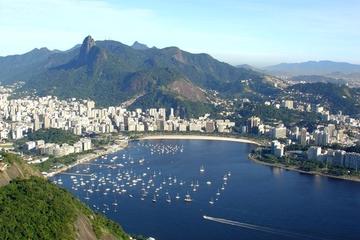
Rio de Janeiro Cruise Port
Already known as one of the world’s most vibrant cities, Rio de Janeiro will likely see its popularity continue to soar as it hosts the 2014 World Cup and the 2016 Summer Olympics. A city of six million people, Rio is glittering, vibrant and sexy and is sure to dazzle most first-time visitors.
How to Get to Rio de JaneiroYour ship will dock at Pier Maua, which is within walking distance of Rio’s central business district. Taxis are readily available, or your cruise ship might arrange transportation for you to Copacabana, Ipanema or the city center. Some jewelry stores may also offer complimentary rides to and from their stores, usually located in Ipanema.
One Day in Rio de JaneiroStart your day with a visit to one of Rio de Janeiro’s most famous sites – Corcovado, the large art deco statue of Christ the Redeemer that stands over 2,000 feet above the city. Get there by taking the funicular from the Cosme Velho station first thing in the morning to enjoy the views and beat the crowds.
Then, head back to central Rio to explore some of the city’s museums and churches. The 16th-century Mosteiro de Sao Bento, the 17th-century Convento do Santo Antonio and the 18th-century Igreja de Nossa Senhora da Candelaria are all worth a visit. Art lovers will then want to make their way to the Flamengo neighborhood, where you will find the Museu de Arte Moderna with its large contemporary art collection and the Museu Nacional de Belas Artes, which showcases Brazil’s top artists from the 19th and 20th centuries.
Spend the rest of the afternoon walking the length of Copacabana Beach, taking in Rio’s legendary beach scene. Continue south to Ipanema, recently named the best beach city in the world. For a quick lunch, you can stop at a lunch counter around Copacabana or Ipanema for a sandwich and fresh fruit juice, or pull up a seat at an outdoor café and enjoy the people-watching.
If you have time for dinner before returning to your ship, don’t miss dining at an all-you-can-eat churrascaria and sampling a caipirinha, a typical Brazilian drink made of sugar cane rum, lime and sugar.
Port InformationThe official language in Brazil is Portuguese, but Spanish may also be spoken. English should be understood in hotels and shops. The local currency is the Brazilian real, but US dollars are widely accepted (change will be given in reales). You should be able to find ATM's and currency exchange offices throughout the city.
